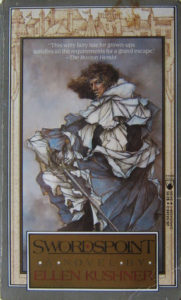I hadn’t read Swordspoint in a long time – certainly not this decade, probably not this century – but it had stayed in my memory as one of three perfect books. At some point, I heard that there were two more novels that shared Swordspoint’s setting, one by Kushner and one she co-wrote with Delia Sherman. I would check for them occasionally on the used book markets, but Kushner seemed to have found the sour spot where there was enough demand for the old editions to command premium prices, but not enough for a new edition to appear. Last month, though, when I was in London I made it to Forbidden Planet a quarter of an hour before closing time, and what did I find? Nice new British editions of The Privilege of the Sword and The Fall of the Kings. Wonderful!
But first, re-read Swordspoint. Would it live up to my recollection? Had the Suck Fairy paid a visit?
Swordspoint takes place in an unnamed but fairly typical fantasy city, and Kushner establishes from the very beginning that artifice will be an important part of the story. The city is divided between Riverside – where the story opens, where crime flourishes but life is vivid and rough justice prevails – and the Hill, home to the nobility, the money, the power, and very little justice. The story follows Richard St Veit Vier [edited to correct throughout], the greatest swordsman of his generation. The city’s nobility have ceased fighting, but they have not stopped intriguing against one another. They call on swordsmen to challenge other nobles, and the hirelings settle the affairs of honor. St Vier is the best in the business, and he knows it. He also knows that it’s usually a short life and appears to have made his peace with that.
St Vier’s latest love, Alec, is a scholar who has been sent down from the University and who speaks in the Hill accent of the very wealthy. He says nothing about his past, but captivates St Vier with his obvious intelligence. He also has a self-destructive streak that attracts the swordsman and matches St Vier’s own, buried, embrace of a life that’s likely to end sooner rather than later. As Swordspoint opens, St Vier has just dispatched two dedicated opponents during a garden party on the Hill, and he is the talk of the town. Half of the talk is about his skill, and the other half is speculation about who is behind the challenges. Swordsmen live by their own codes, and proclaiming who stands behind their deadly strokes isn’t done. St Vier is prouder than most; he is choosy about his clients; he doesn’t teach, he doesn’t kill women, he doesn’t work as a house guard, and he doesn’t stand as an honorary guard to ornament a rich noble’s wedding. He’s also profligate with money when he has it, and neglects to convert to cash the jewels some of his jobs have brought. As a result, he is poor at least as often as he is rich.
St Vier likes to believe that he can just do his jobs without thinking about the purposes the nobles have in mind. He disdains them as much as they dismiss the people of Riverside. Inevitably, though, personal jealousies and ambitions prove stronger than the codes of honor and social distance that are supposed to regulate relations between swordsmen and nobles, between Riverside and the Hill. People’s virtues prove to be their undoing, or nearly so. It is a novel of style and facades, but also one that shows a deep understanding of people, passions, and the prices they are willing to pay.
The book is chock full of tasty details and elegant set pieces as it veers between the decadence of the Hill and the rough energy of Riverside. There’s the pickpocket at work among the gawkers at a fireworks display, the banter on the nobility’s river barges during the same display, banter that may just be for amusement or may set up feuds that can turn deadly at a challenge’s notice. There’s a play-within-the-novel, about which the swordsmen have superstitions. St Vier flaunts the superstitions for all to see, and of course betting starts immediately about whether the curse will fall on him, too.
Kushner manages her large cast with aplomb. It’s not difficult to tell Lord Horn from Lord Ferris from Lord Halliday or many more among the nobility. They are rounded characters, showing their strengths and foibles, even if they are not at the center of the narrative. It’s a brilliant swirl, with danger lurking around many corners, delight around others, and maybe both right across the street down in Riverside or up on the Hill.


3 comments
2 pings
This is lovely, thanks! I always worry about the suck fairy, too.
Just one small note: the swordsman’s name is “St Vier,” rather than “St Veit”
Author
Thank you! How did I make that mistake?!
P.S.
All three of the “Swordpsoint/Riverside” series books have actually not been out of print in the U.S. editions since 2001, which may be why they’ve been hard to find used.
[…] how you open the follow-up to a perfect book. The Privilege of the Sword starts about fifteen years after Swordspoint, and follows the fortunes […]
[…] praise because it’s fine, really it is. It’s just that this book follows the perfect Swordspoint and the extremely good The Privilege of the Sword, and while The Fall of the Kings is an […]